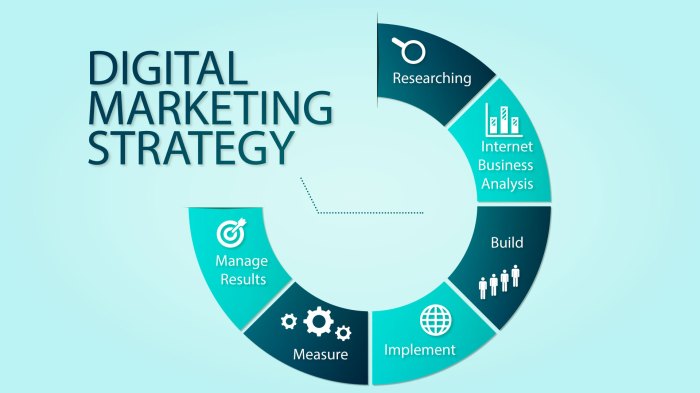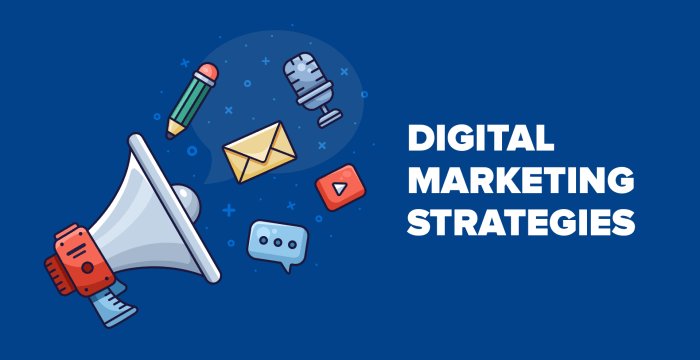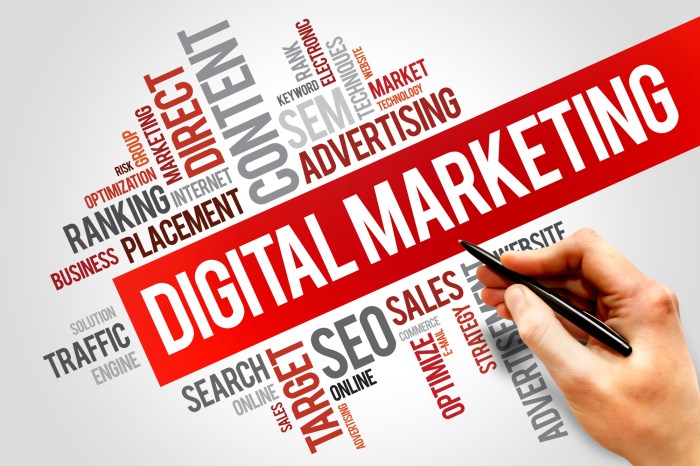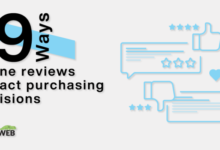
Digital marketing strategies for small businesses are essential in today’s competitive landscape, where online visibility can make or break a company. From leveraging to harnessing the power of social media, this guide explores key strategies to help small businesses thrive in the digital realm.
The discussion will delve into the importance of digital marketing, effective strategies, creating a tailored marketing plan, and utilizing content marketing to drive growth.
Importance of Digital Marketing for Small Businesses: Digital Marketing Strategies For Small Businesses
Digital marketing plays a crucial role in the success of small businesses in today’s competitive market. It offers a cost-effective way to reach a larger audience, build brand awareness, and engage with potential customers online. Here are some key reasons why digital marketing is essential for small businesses:
Increased Visibility and Reach
- With digital marketing strategies such as search engine optimization () and social media marketing, small businesses can increase their online visibility and reach a wider audience.
- By utilizing targeted ads and content, businesses can connect with potential customers who are actively searching for products or services similar to theirs.
- Platforms like Google Ads and Facebook Ads allow small businesses to reach their target audience based on demographics, interests, and online behavior.
Brand Awareness and Credibility
- Digital marketing helps small businesses establish their brand presence online and build credibility with consumers.
- Through consistent branding, engaging content, and customer interactions on social media, businesses can create a strong brand identity and establish trust with their audience.
- Positive online reviews, testimonials, and user-generated content also contribute to building a reputable brand image in the digital space.
Cost-Effective Marketing Solutions
- Compared to traditional marketing methods, digital marketing offers cost-effective solutions for small businesses with limited budgets.
- Businesses can track the performance of their digital marketing campaigns in real-time and make adjustments to optimize their marketing efforts for better results.
- Email marketing, content marketing, and social media promotions are affordable options that deliver measurable results and a high return on investment for small businesses.
Key Digital Marketing Strategies for Small Businesses

When it comes to digital marketing for small businesses, it is essential to focus on strategies that are cost-effective yet impactful. Let’s explore some of the most effective digital marketing strategies suitable for small businesses.
and Its Significance for Small Business Digital Marketing
Search Engine Optimization () plays a crucial role in ensuring that your small business website ranks well on search engine results pages. By optimizing your website with relevant s, creating high-quality content, and improving user experience, you can increase your visibility online and attract more organic traffic.
Choosing the right server backup solution is crucial for data protection and disaster recovery. Top server backup solutions offer features like automated backups, encryption, and scalability. To explore the top server backup solutions available in the market, you can refer to this link: Top server backup solutions.
- Research: Conduct thorough research to identify relevant search terms that your target audience is using.
- On-Page Optimization: Optimize your website’s meta tags, headings, and content to make it more search engine-friendly.
- Quality Content: Create informative and engaging content that not only attracts visitors but also keeps them on your site longer.
- Link Building: Build backlinks from reputable websites to increase your site’s authority and credibility.
Social Media Marketing in Promoting Small Businesses Online
Social media marketing is another powerful strategy for promoting small businesses online. By leveraging popular social media platforms like Facebook, Instagram, Twitter, and LinkedIn, you can connect with your target audience, build brand awareness, and drive traffic to your website.
RAID (Redundant Array of Independent Disks) servers offer various benefits such as data redundancy, increased performance, and fault tolerance. By integrating RAID technology, organizations can ensure data protection and minimize downtime. For more information on the benefits of a RAID server, you can check out this link: Benefits of a RAID server.
- Engagement: Engage with your followers by responding to comments, messages, and mentions to build relationships and trust.
- Content Sharing: Share a variety of content such as blog posts, videos, images, and infographics to keep your audience interested and engaged.
- Advertising: Utilize paid social media advertising to reach a larger audience and target specific demographics based on your business goals.
- Analytics: Monitor your social media performance using analytics tools to track engagement, click-through rates, and conversions.
Creating a Digital Marketing Plan for Small Businesses

Developing a digital marketing plan is crucial for small businesses to effectively reach their target audience and achieve their business goals. A well-thought-out strategy can help maximize resources and ensure a strong online presence.
A server load balancer is a device that distributes incoming network traffic across multiple servers, ensuring no single server gets overwhelmed. This improves overall performance and reliability of the system. To learn more about what a server load balancer is, you can visit this link: What is a server load balancer.
Importance of Setting Goals and Objectives, Digital marketing strategies for small businesses
Setting clear and specific goals and objectives is the foundation of any successful digital marketing plan for small businesses. These goals provide direction, focus, and a roadmap for the marketing efforts. Here are the steps to develop a comprehensive digital marketing plan tailored for small businesses:
Sample Digital Marketing Plan for a Small Business
Below is a sample Artikel of a digital marketing plan for a small business:
- Identify Target Audience: Conduct market research to define the target audience based on demographics, interests, and online behavior.
- Set SMART Goals: Define specific, measurable, achievable, relevant, and time-bound goals that align with the business objectives.
- Choose Digital Marketing Channels: Select the most appropriate digital marketing channels such as social media, email marketing, , PPC, and content marketing.
- Create a Content Calendar: Develop a content calendar to plan and schedule engaging and relevant content for the target audience.
- Implement Strategies: Optimize the website and content for search engines to improve visibility and attract organic traffic.
- Monitor and Measure Performance: Use analytics tools to track the performance of digital marketing campaigns and make data-driven decisions for optimization.
- Allocate Budget and Resources: Allocate budget and resources effectively to maximize the impact of digital marketing efforts.
Utilizing Content Marketing for Small Business Growth

Content marketing plays a crucial role in helping small businesses attract and retain customers in a competitive digital landscape. By creating valuable and engaging content, small businesses can establish their brand presence, build credibility, and connect with their target audience on a deeper level.
Tips for Creating Engaging and Valuable Content
Creating compelling content for digital marketing involves understanding the needs and preferences of your target audience. Here are some tips to help small businesses create engaging and valuable content:
- Identify your target audience: Conduct market research to understand the demographics, preferences, and pain points of your target customers.
- Create relevant and informative content: Develop content that addresses the needs and interests of your audience, providing solutions to their problems or valuable information.
- Use different formats: Experiment with various content formats such as blog posts, videos, infographics, podcasts, and social media posts to cater to different preferences.
- Optimize for search engines: Use relevant s and optimize your content for to improve visibility and attract organic traffic.
- Tell a story: Connect with your audience on an emotional level by sharing stories that resonate with them and showcase your brand values.
Importance of Consistency in Content Creation
Consistency is key when it comes to content marketing for small businesses. By maintaining a regular schedule of content creation and distribution, businesses can stay top-of-mind with their audience and build brand loyalty over time. Consistent content creation also helps improve rankings, establish thought leadership, and drive traffic to your website.
Closing Summary

In conclusion, implementing the right digital marketing strategies can significantly impact a small business’s success. By focusing on online visibility, engaging content, and strategic planning, small businesses can position themselves for growth and increased brand recognition in the digital space.


